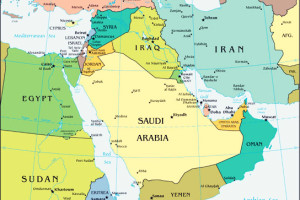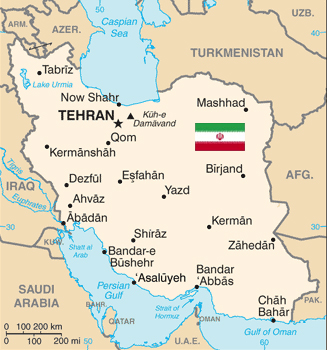Russia Shouldn’t Put All Its Middle East Eggs in Iran’s Basket, Warn Experts

(Moscow Times – themoscowtimes.com – Ivan Nechepurenko – April 3, 2015)
As Russia’s role in the Middle East was thrown into the spotlight this week by Wednesday’s attack on the Russian Consulate in Yemen and by the ongoing Iran nuclear talks, analysts said siding with Iran completely would significantly limit Moscow’s options in future conflicts.
 Iran may be the current linchpin of Russian policy in the Middle East, but aligning itself with it completely would lock Russia up with a power that is important but not dominant in the region, pundits told The Moscow Times on Thursday.
Iran may be the current linchpin of Russian policy in the Middle East, but aligning itself with it completely would lock Russia up with a power that is important but not dominant in the region, pundits told The Moscow Times on Thursday.
Russia’s support of President Bashar Assad in Syria’s civil war during the last four years and its rapprochement with Iran – two countries led by Shia-aligned Muslims – have damaged the Kremlin’s relations with the Sunni-adherent states that constitute an overwhelming majority in the Middle Eastern region, they said.
Around 85-90 percent of the world’s Muslims are Sunni, and the remaining 10-15 percent are Shia.
“The difficulty is that the more Russia supports Shia Iran, the more difficult it is to have good relations with the Saudis and the Sunni world,” Alexei Malashenko of the Carnegie Moscow Center said.
“It is in Russia’s interest to stay above the divisions and have influence among all parties,” he said in a phone interview.
Choosing Allies
A group of Houthi rebels and supporters of former President Ali Abdullah Saleh stormed and looted the Russian Consulate in the Yemeni port city of Aden on Wednesday. The building was empty at the time, as diplomats had been evacuated on a Russian navy ship the day before, the Foreign Ministry said in a statement.
The Houthi rebel group that currently controls large swathes of Yemen’s territory – including the capital Sanaa – is reportedly supported with weapons and money by Iran, home to the world’s largest Shia population. Iran denies the allegations.
The Houthis are currently fighting against a Saudi Arabia-led coalition of Arab countries, including states of the Gulf Cooperation Council, as well as Egypt, Jordan, Morocco and Sudan, which began carrying out airstrikes against Yemen at the end of March.
The rebels, like Iran’s leaders, belong to the Shia branch of Islam, while members of the Saudi-led coalition are predominantly Sunni denominated. The two major branches of Islam have historically served as demarcation lines for sectarian strife among Muslims.
Russia has avoided siding with any of the warring parties, with Foreign Minister Sergei Lavrov calling on both the Saudi-led coalition and the Houthi rebels to stop fighting and negotiate.
At the same time, following Moscow’s support of Syria’s President Assad, Russia is seen as a patron of Shia Muslims and states, said Alexander Shumilin, head of the Center for Analysis of Middle East Conflicts at the Institute for U.S. and Canada Studies in Moscow.
“After Syria, Russia is increasingly seen as an ally of Shia elites in Iran, and now in Yemen, where it is against foreign intervention, which diminishes its influence in Sunni states,” Shumilin told The Moscow Times in a phone interview.
Russia has supported Assad, an adherent of the Alawite branch of Shia Islam, and successfully opposed U.S. plans to launch airstrikes against his regime in September 2013. Apart from Russia, Iran is Assad’s most powerful ally in the civil conflict raging in his country.
Russia’s role in averting U.S. military action against the Syrian government was seen as an international success of President Vladimir Putin, but also reportedly irritated conservative elites in the United States.
Making Enemies
In addition, Russia has also been one of the more lenient parties in the ongoing series of international negotiations over Iran, defending the Islamic country’s right to develop nuclear energy.
Talks continued through Thursday after the six negotiating states failed to meet another deadline Tuesday to reach an agreement. The German foreign ministry said Thursday that an agreement had been reached on the framework for a final agreement.
Saudi Arabia has been fiercely opposed to an agreement over Iran’s nuclear program, and has also accused Russia of stirring up trouble in Syria. The level of Saudi irritation with the Kremlin became evident Sunday, when Saudi Arabia’s Foreign Minister Prince Saud al-Faisal accused Putin of hypocrisy over his letter to the Arab League, news agency Reuters reported.
“We support the Arabs’ aspirations for a prosperous future and for the resolution of all the problems the Arab world faces through peaceful means without any external influence,” Putin’s letter said, according to the Kremlin’s website.
These comments triggered a sharp and unusual rebuke from al-Faisal.
“He speaks about the problems in the Middle East as though Russia is not influencing these problems,” he told the summit right after the letter was read out.
“They speak about tragedies in Syria while they are an essential part of the tragedies befalling the Syrian people, by arming the Syrian regime above and beyond what it needs to fight its own people,” Prince Saud said.
Saudi Arabia, an ultraconservative Islamic absolute monarchy, has been a longtime ally of the United States, with the two countries enjoying what they describe as a “special relationship” with each other.
Strength Through Mediation
According to Shumilin, Russia’s open confrontation with the United States over Ukraine, its support of Assad in Syria and its growing ties with Iran – where Russia is set to build eight nuclear power units under an agreement signed last November in Moscow – have all limited the Kremlin in its Middle East policy choices.
“The most advantageous position for Russia would be as a mediator between Iran, Saudi Arabia and other parties,” he said.
Malashenko shared the same sentiment, saying that Russia is stronger when it mediates a conflict between parties, rather than when it sides with one of them.
“Russia is important when there is a conflict. When everything is peaceful, Russia is not needed,” he added.
